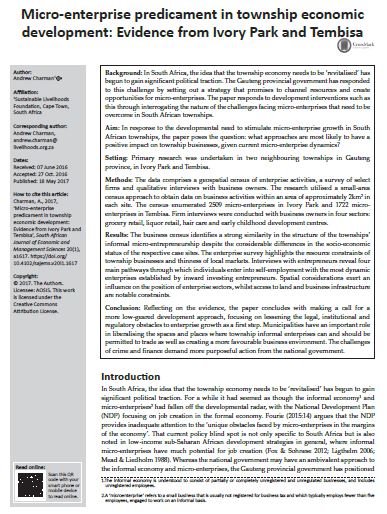Micro-enterprise predicament in township economic development
Evidence from Ivory Park and Tembisa

Background: In South Africa, the idea that the township economy needs to be ‘revitalised’ has begun to gain significant political traction. The Gauteng provincial government has responded to this challenge by setting out a strategy that promises to channel resources and create opportunities for micro-enterprises. The paper responds to development interventions such as this through interrogating the nature of the challenges facing micro-enterprises that need to be overcome in South African townships.
Aim: In response to the developmental need to stimulate micro-enterprise growth in South African townships, the paper poses the question: what approaches are most likely to have a positive impact on township businesses, given current micro-enterprise dynamics?
Setting: Primary research was undertaken in two neighbouring townships in Gauteng province, in Ivory Park and Tembisa.
Methods: The data comprises a geospatial census of enterprise activities, a survey of select firms and qualitative interviews with business owners. The research utilised a small-area census approach to obtain data on business activities within an area of approximately 2km2 in each site. The census enumerated 2509 micro-enterprises in Ivory Park and 1722 microenterprises in Tembisa. Firm interviews were conducted with business owners in four sectors: grocery retail, liquor retail, hair care and early childhood development centres.
Results: The business census identifies a strong similarity in the structure of the townships’ informal micro-entrepreneurship despite the considerable differences in the socio-economic status of the respective case sites. The enterprise survey highlights the resource constraints of township businesses and thinness of local markets. Interviews with entrepreneurs reveal four main pathways through which individuals enter into self-employment with the most dynamic enterprises established by inward investing entrepreneurs. Spatial considerations exert an influence on the position of enterprise sectors, whilst access to land and business infrastructure are notable constraints.
Conclusion: Reflecting on the evidence, the paper concludes with making a call for a more low-geared development approach, focusing on lessening the legal, institutional and regulatory obstacles to enterprise growth as a first step. Municipalities have an important role in liberalising the spaces and places where township informal enterprises can and should be permitted to trade as well as creating a more favourable business environment. The challenges of crime and finance demand more purposeful action from the national government.



Comments